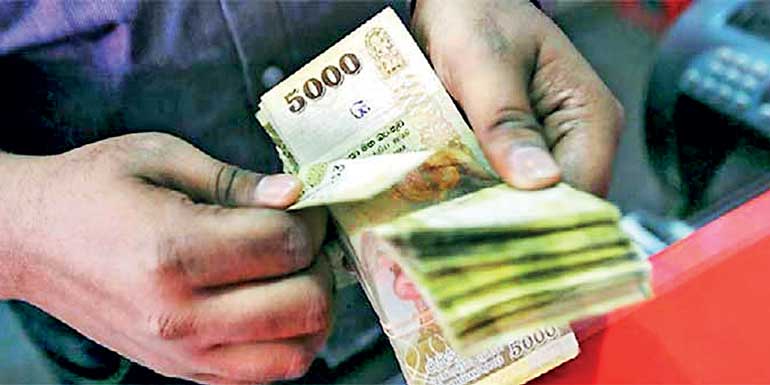Monday Feb 16, 2026
Monday Feb 16, 2026
Tuesday, 10 January 2023 01:34 - - {{hitsCtrl.values.hits}}

Since the year 2023 can be considered a ‘Year of Taxation’, one can only hope that it should also be a year for proper tax reforms with the objective of setting a long-term national tax policy
Mandatory withholding tax and AIT

The mandatory withholding tax (WHT) and Advance Income Tax (AIT) regime has been re-introduced. Accordingly, payments such as interest, dividend, rent, royalty, etc., are subject to AIT. Further service fees paid to a resident individual if more than Rs. 100,000 per month will be subject to a withholding tax of 5%. The AIT on interest, dividend, rent and WHT on service fees paid to a resident are detailed below.
Withholding tax/AIT will not apply if payments are done by an individual unless the payment is made in conducting a business. In other words, an individual does not have to bear the burden of a withholding agent.
AIT on interest
The CGIR has issued instructions to the Banks and Financial Institutions dated 20 December 2022 on AIT deduction on interest. Any interest payments on deposits by the bank will be subject to a 5% withholding tax unless an exemption applies.
The withholding tax regime on interest was applicable when the new Inland Revenue Act No. 24 of 2017 was implemented with effect from 1 April 2018 where 5% tax was withheld. However, it was considered a final withholding payment for a resident individual and a final tax. A final withholding payment denotes that there will not be any further taxes imposed. This withholding tax on interest regime was revised on 1 January 2020 where the mandatory withholding tax of 5% on interest was removed and where AIT was introduced. AIT was not considered a final withholding payment for a resident individual (post 1 January 2020). The provision was available for a person to provide consent to deduct AIT of 5% at source which could be claimed as a tax credit later when filing the Return of Income. Effective from 1 January 2023, revisions are introduced to the application of AIT.
AIT on interest applicable from 1 January 2023 onwards
nA 5% AIT will be deducted on payment of any amounts by banks and financial institutions as interest and discount including income received from Islamic financial transactions which have a source in Sri Lanka. The AIT deduction will apply to both Resident and Non-Resident unless it is an exempt interest.
nInterest accruing to a person on foreign currency deposits is exempt from income tax and AIT of 5%. Further if a person has a ‘special deposit account’, the interest accruing to the same is also exempt from income tax and AIT
nInterest paid to a resident is not considered a final withholding payment hence the 5% AIT is not considered a final tax. The deposit holder is expected to pay taxes as per the progressive tax slabs and rates and the AIT deducted of 5% can be claimed as a tax credit. This mechanism can be easily followed where the taxable income of the individual is more than Rs. 1.2 m.
nIn case a person’s total taxable income is below the personal relief of Rs. 1.2 m, will the AIT of 5% still apply on the deposit interest (which is below Rs. 1.2 m per annum)?, is a question that many would have. The response is complex which warrants a look at how the Law on WHT/AIT on deposit interest has evolved. As per the current Law there is no direction mechanism, so although a person’s taxable income is less than Rs. 1.2 m per annum, the bank and financial institutions are still compelled to deduct AIT on the deposit interest irrespective of the amount (even if the interest income is less than personal relief threshold of Rs. 1.2 m). Further, interest paid to a resident individual is not considered a final withholding payment and thereby the AIT deducted on Interest is not considered a final tax.
nThis gives rise to another question. Can a person file a Return of Income and make a claim for tax credit since 5% AIT is deducted while the person is below the taxable income threshold of Rs. 1.2 m?
nUnfortunately, although every person can file a Return of Income, Section 94 of the Act states that a person is not required to file a Return of Income if there is no taxable income. In this context, another dilemma is whether the Inland Revenue Department will permit a person below the taxable income threshold to file a Return of Income only for the purpose of claiming a refund (the AIT deducted of 5%). This is indeed an anomalous situation.
nIf the intention of the policy maker was not to collect taxes from a person with less than Rs. 1.2 m taxable income, an introduction of a direction mechanism will be the best path so that the banks and financial institutions can refrain from deducting AIT if the deposit holder provides the necessary direction stating the income is below the threshold. Current Income Tax Law does not provide a framework for issuance of directions. This situation may cause injustice to many taxpayers.
nIn the past under the previous Income Tax Act (Inland Revenue Act No. 10 of 2006), an exemption was available for interest accruing to savings accounts where the interest is less than Rs. 5,000 a month. An exemption similar to this may also be considered by the policy makers for the benefit of both the taxpayer and the banks and financial institutions who have to bear the administrative burden in acting as a withholding agent.
AIT on rent
A 10% AIT deduction will apply on full payment of rent paid to a resident person and such tax deducted will not be considered a final tax. Rent is defined in the income tax law and has a broad definition and not only restricted to land or building. The Act defines “rent” as (a) means a payment, including a payment of a premium or like amount, for the use of or right to use property of any kind; (b) includes a payment for the rendering of, or the undertaking to render, assistance ancillary to a use or a right referred to in paragraph (a); but excludes royalty and natural resource payment.
If the rent payment is to a non-resident person, the AIT rate of 14% will apply and it will be considered a final tax.
AIT on dividends
Payment of dividend from 1 January 2023 will be subject to a withholding tax of 15% (subject to exemptions). Dividends paid is considered a final withholding payment and such tax deducted will be considered a final tax.
Mandatory withholding tax of 5% on identified service fees
Service fees paid to a resident individual (who is not an employee of the payer) on identified payments in aggregate exceeding Rs. 100,000 per calendar month will be subject to a 5% withholding tax. The identified services are as follows.
nService fee for teaching, lecturing, examining, invigilating or supervising an examination.
nService fee as a commission or brokerage to a resident insurance, sales or canvassing agent;
nFor services provided by individual in the capacity of independent service provider such as doctor, engineer, accountant, lawyer, software developer, researcher, academic or any individual service provider as may be prescribed by regulation:
The CGIR has the power to prescribe other services by issuing Regulation which should be subject to 5% withholding tax.
Mandatory AIT/WHT where the taxable income is less than Rs. 1.2 m
The same anomalous situation which was explained earlier under ‘AIT on interest’ arises in relation to all payments where a mandatory AIT or Withholding tax would be applicable where the recipient of the income is below the taxable income threshold of Rs. 1.2 million. As explained above, since the intention was not to deduct taxes from persons below the threshold of Rs. 1.2 million, the policy makers should consider the introduction of a direction mechanism to ensure that the tax deduction will not be carried out at source.
The above article only attempts to give a glimpse of the key changes to personal income tax regime and to highlight certain inconsistencies that should be addressed. There are many other areas that warrant discussion and attention. A high-income tax regime is a challenge to adapt for both the taxpayer and the tax administrator. The policymakers should ensure there is minimal ambiguity and that the tax policy is in line with the economic policies. Certain measures that the policymakers could introduce are:
Many taxpayers would like to avail opportunity to directly contribute to welfare programs of the underprivileged since there would be clarity and transparency on how the contribution was utilised. In the said context, the policy makers may consider granting a tax deduction for donations made to orphanages, elderly homes, underprivileged schools, community kitchens, etc. A registration mechanism can be introduced for the recipient of such donations.
Since the year 2023 can be considered a ‘Year of Taxation’, one can only hope that it should also be a year for proper tax reforms with the objective of setting a long-term national tax policy. In this context many of us keep our fingers crossed for the early implementation of the Presidential Taxation Commission proposed in the Budget 2023.
(The writer is Director – Tax and Regulatory at KPMG.)